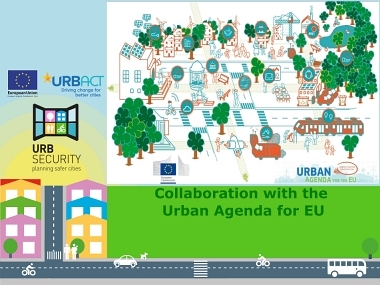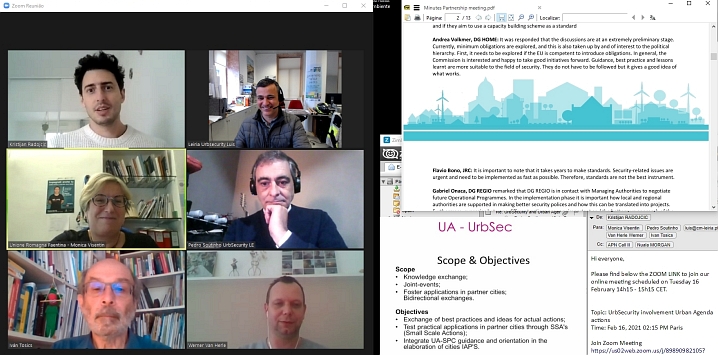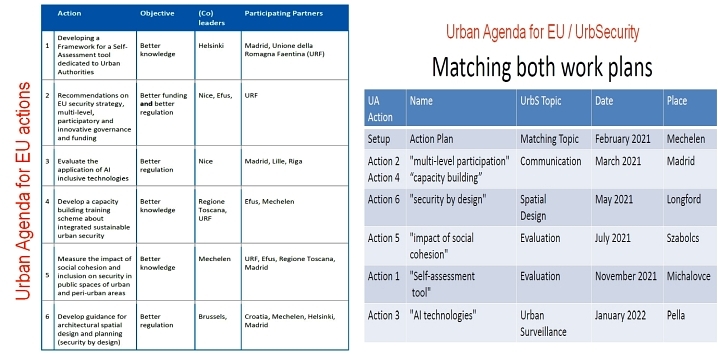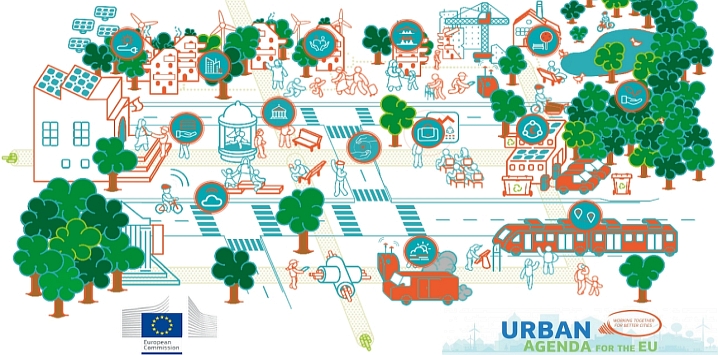Collaboration with the Urban Agenda for EU
Edited on
16 September 2022
European Partnership on Security in Public Spaces
The aim of the Urban Agenda for the EU (UAEU) was to analyze and find solutions to the problems facing European cities, to establish partnerships between the European Commission, European organizations, national governments, local authorities, and various stakeholders such as non-governmental organizations.
In January 2019 the "Security in Public Spaces" partnership was established and involved the members of the UAEU and the Urbact network partners (UrbSecurity project), Eurocities, UN Habitat and the "Fundamental Rights Agency" (FRA). The result of this partnership is action plans with the goal of passing better laws, increasing funding programs, and sharing acquired knowledge (data, studies, and good practices).
List of partners:
Coordinator: City of Nice (FR)
Coordinator: European Forum for Urban Security
Coordinator: Madrid City Council (ES)
Riga City Council (LV)
City of Helsinki (FL)
City of Mechelen (BE)
Métropole Européenne de Lille (FR)
City of Toruń (PL)
Unione della Romagna Faentina (IT)
Regione Toscana (IT)
Brussels-Capital Region (BE)
Ministry of Transport (CZ)
Ministry of Construction and Physical Planning (HR)
European Commission (REGIO, HOME, RTD, JRC, EMPL)
European Investment Bank (EIB)
Observers (Eurocities, UN Habitat)
Urban Agenda Secretariat (Ecorys, EUKN)
Members of our UrbSecurity project participated in this working group in several online meetings and in person through our partners from Italy (Unione della Romagna Faentina) and Belgium (Mechelen). Our Italian partner attended the last EFUS conference held in Nice in Oct 2021, and participated in the parallel session presenting the results of the work on EU funding opportunities for regional and local authorities.

Despite the pandemic having locked us at home, the massive use of online applications allowed us to hold a huge series of meetings with partners from all over Europe. Perhaps it would not have been possible otherwise, not only in the number but mainly in the diversity of the origin of the participants from the southwest to the northeast of Europe and in the debate and exchange of experiences that this fact provided.

This cooperation with other networks was also important not only for the contributions derived from our participation in the APN, but also for the reflection that we were able to make on the themes addressed and subsequently bring these issues to the table for debate and joint analysis with our stakeholders.

Due to the different end dates of the projects, an effort was made to reconcile the agendas of the work, in order to make it as fruitful as possible and been able to participate bi-laterally in almost all of the Transnational Meetings. Since the closure and presentation of the results of the UAEU took place before ours, it was possible to incorporate some of the results of this partnership in UrbSecurity IAPs.

As a result of this work, in June 2021, the European Council adopted the following conclusions on the protection of public spaces and shared them with the European commission bodies and the member states. (link) As an example the last of these conclusions encouraged some Urbsecurity members to pay increased attention and incorporate CPTED methodology at the local level through public-private partnerships and projects, as a mechanism to protect public spaces.
The Urban Agenda for the EU followed this action plan (link), which was divided into these six actions:
- ACTION 1 - Developing a framework for a self-assessment tool dedicated to urban authorities
Report on Approaches and Tools to Assess and Measure Security and Safety in Urban Areas (link)
Results of Pilot Self-Assessment tool to assess and measure security and safety in urban areas (link)(link)
- ACTION 2 - Recommendations on EU security strategy, multi-level governance and funding
Final Report on EU financing for urban security projects in 2021-2027 (link)(link)
- ACTION 3 – Evaluate the application of AI technologies
Final Report on Facial Recognition Technology (FRT) (link)
- ACTION 4 – Develop a capacity building training scheme about integrated urban security
Toolkit for the re-use of dismissed or abandoned open spaces or buildings (link)
- ACTION 5 – Measure the impact of social cohesion on security in public spaces
Manual Prevention Pyramid (link)
Final report on the importance of social cohesion for urban crime prevention (link)
The Collective Impact model and its application in European Cities with a special focus on the topic of urban security and social cohesion (link)
- ACTION 6 – Develop guidance for architectural and spatial design (security by design)
10 Rules of Thumb for the Security by Design approach (link)
A number of interesting articles have also resulted from this work. (link)
- Article #1: Digital gamechanger? How Europe’s cities are adapting to the impact of COVID-19 on jobs and skills (link)
- Article #2: Striving towards a greener Europe - Climate adaptation and energy transition driving change in urban areas (link)
- Article #3: Looking at European lessons to turn data into public data and unleash the transformative power of city data (link)
- Article #4: Cities’ transformation in the post COVID-19 era with a focus on urban planning (link)
- Article #5: How UAEU partnerships can be used by policy and decision-makers to end homelessness and provide adequate and affordable housing (link)
- Article #6: Breaking the cycle of poverty for a more social and inclusive Europe (link)
- Article #7: How to design safe and sustainable cities through the lens of public procurement (link)
- Article #8: How under-used space and infrastructure can become testbeds for new cities (link)

We can consult this brochure that highlights the diversity and variety of Urban Agenda actions and achievements (UAEU multi-level governance in action). (link)
"The Urban Agenda for the EU will continue being at the heart of urban transformations, acting as a space for dialogue and for action. By focusing on urban challenges such as climate adaptation, digital transition or jobs and skills, it contributes to enhanced and more sustainable development solutions in European cities."
Elisa Ferreira, Commissioner for Cohesion and Reforms
links
https://www.urban-agenda.eu/
https://futurium.ec.europa.eu/en/urban-agenda
LP
Submitted by Patricia Moital on
